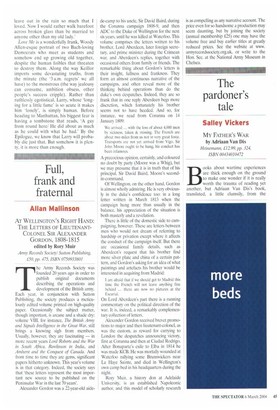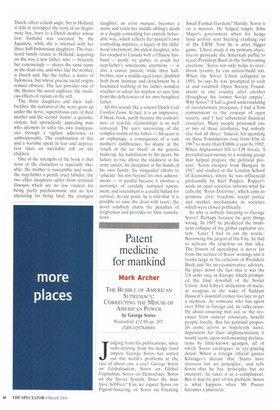The pardoner's tale
Salley Vickers
MY FATHER'S WAR by Adriaan Van Dis Heinemann, £12.99, pp. 324. ISBN 00434010472 Books about wartime experiences are thick enough on the ground to make one wonder if it is really worth the trauma of reading yet another, but Adriaan Van Dis's book, translated, a little clumsily, from the
Dutch, offers a fresh angle. Set in Holland, it tells in retrospect the story of an illegitimate boy, born to a Dutch mother whose first husband was executed by the Japanese, while she is interned with her three half-Indonesian daughters. The fractured family return to Holland, acquiring on the way a new father, who — bizarrely but convincingly — shares the same name as the dead one, and who, like the mother, is Dutch and, like the father, a native of Indonesia, but whose precise racial origins remain obscure. The last provides one of the themes the novel explores: the insidious effects of racism on the self.
The three daughters and their halfbrother, the narrator of the story, grow up under the nervy, superstitious care of their mother and the second 'Justin', a quixotic, violent, but sporadically appealing man who attempts to solve his own inadequacies through a vigilant adherence to anthroposophy, The combination of this and a wartime spent in fear and deprivation takes an inevitable toll on the children.
One of the strengths of the book is that none of the characters is especially likeable: the mother is susceptible and weak, the step-father a pettily cruel fabulist; the two elder daughters suffer from terminal illnesses which are no less virulent for being partly psychosomatic and no less alienating for being fatal; the youngest daughter, an artist manqué, becomes a nurse and tends her middle sibling's death in a deeply controlling but entirely believable way, which reflects her patient's own controlling impulses, a legacy of the childhood internment; the eldest daughter, who has escaped to Canada with a Chinese husband — partly, we gather, to evade her step-father's unwelcome attentions — is also a cancer patient, while their halfbrother, now a middle-aged loner, disabled both from intimacy and detachment by a fascinated loathing of his father, wonders whether to adopt his nephew to save him from the deficiencies of his own benighted father.
All this sounds like a solemn Dutch Cold Comfort Farm. In fact, it is an impressive, if bleak, book, partly because the contrariness of real-life relationships is so well conveyed. The son's uncovering of the complex reality of his father — his years in an orphanage, a consequence of a vain mother's indifference, his shame at the 'touch of the tar brush' in his genetic make-up, his humiliation by his peers, his failure to rise above the mediocre in his army career, his deception at the hands of his own family, his misguided efforts to 'educate' his son beyond his own achievements — is painful because it involves a surrender of carefully nurtured resentment, and resentment is a useful ballast for survival. At one point, he is told that 'it is possible to raise the dead with tears'; the novel sombrely charts the penalties of forgiveness and provides no false consolations.



















































































 Previous page
Previous page